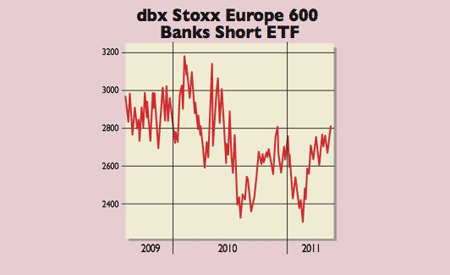
The European banking sector is nearing the share-price lows it hit in May and November last year. But I think the sector has further to fall. The good news is that, if you agree, there’s an exchange-traded fund (ETF) that allows you to bet on this outcome. But before I get to that, why do I believe there are further falls ahead?
First, the financial sector has to shrink, particularly in countries where banks grew to outsize proportions during the bubble. So far politicians are fudging the issue – telling banks to improve the state of their balance sheets, while at the same time pressurising them to lend more. But there’s growing support for Bank of England risk chief Andy Haldane’s view that banks’ balance sheets are simply too big for their economies to support. As an investor, it makes sense to avoid sectors where the underlying business is shrinking.
Second, “burden sharing” threatens to land banks with a significant share of losses from the debt crisis. The policy of refusing to impose losses on theowners of bank bonds is being reversed. With the prospect of sovereign defaults across Europe, the value of government guarantees that banks’ debts will be underwritten is questionable. Remember – bondholders get paid first and shareholders last. If banks’ bonds face losses, are their shares worth much at all?
Third, the policy of bailing out every bank at any cost means some very badly run organisations are still in business. Propping up zombie banks is bad news for their better-run competitors, who find themselves undercut by state-subsidised rivals. That means it’s hard for the sector as a whole to make much of a return. Lastly, there’s still no balance in most banks between the rewards offered to staff and those left for shareholders. Note how quickly most bank chiefs returned to bonuses (sorry, ‘business’) as usual once the worst of the credit crunch appeared to be behind them. However, bank payrolls are still bloated – costs still swallow up to 80% of income in some investment banks.
This is why I’m holding the db x-trackers’ Stoxx Europe 600 Banks Short Daily (LSE: XS7S) ETF. It gives the inverse return (compounded daily) on the most widely used European bank sector index. In other words, it rises if banks’ share prices fall. It’s a convenient way to short the sector – but remember that, due to the daily compounding, the return will diverge over time from minus one times the ‘long’ version of the index, so do keep an eye on its performance.
• Paul Amery edits
www.indexuniverse.eu
, the top source of news and analyses on Europe’s ETF and index-fund market.by Paul Amery